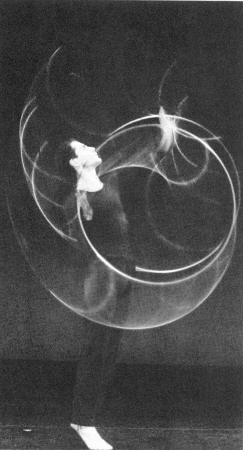 |
Page 12 Winter 1989 - 90
|
A
break-through followed, in the form of his wellknown work with
crystal balls, which seem to shimmer and
Then
came the stick piece, with a feeling opposite to the crystal balls.
He associated the metal rods with the use
Moschen
doesn't expect or want the audience to be overtly conscious of such
specific factors behind his work, but just "the fascination and
the almost hypnotic quality, the process of involvement, the sense
of creative questioning about life."
He
has toured extensively with clown Bob Berky, who has helped Moschen
find his own kind of humor in his work, and with Fred Garbo. In 1985
he and Berky appeared at BAM as "The Alchemedians." He has
also performed in Bill Irwin's "Not Quite/New York" and
"The Courtroom," and in the films "Hair,"
"Annie," and "Labyrinth," where he served as
David Bowie's hands. He has also been featured on the avantgarde
performance series on television, "Alive from Off Center."
He's toured all over the world, in South America, Australia, Hong
Kong, Saudi Arabia as well as Europe. "Being able to travel is
beautiful," he says. "If you're open to people, it'll
change your work."
He
used to teach extensively, but no longer. "I always found that
the innocence of people who didn't know how to juggle was
beautiful," he says. "I could control the environment
enough not to squash their creativity and vulnerability, and to
encourage them to make mistakes, because that opens you up. Then
you'll learn about what control is. But the people
"I
had a terrible experience at the Movement Theater Festival in
Philadelphia [two years ago]. The advanced class literally started
strangling each other, tripping each other, sabotaging each other and
me, because they couldn't face the fact that they couldn't control one
ball and their body. I wasn't trying to shame anybody, I was trying to
see how they could find another basis to start from, for understanding
what a juggler
is for themselves. And then a number of people tried to steal my
material - I performed down there with Bob Berky. It just became an
untenable situation, and I ended it in a very dramatic fashion. I was
just pushed too far."
Other
instances, too, of people
copying his material or taking credit
for discoveries that he has taught them have been further
reason for disaffection. "To take the simplest, least challenging
route of taking somebody else's work
instead of developing your own doesn't make any sense. Life has
to be about risks," he declares
with some vehemence. "Art is about a certain kind of truth. And
in circumstances when people have stolen my material, either students
or whatever, the deepest anger that
I've had is that it's a violation of a kind of
truth."
Moschen's
daily rehearsal schedule changes all the time according to the needs
of the moment. Some days he might rehearse less because he's doing
other kinds of research, in books, a sculpture studio or
art galleries, or working with collaborators, to
whom he attaches great importance. He uses a
fast warm-up or a slow warm-up depending on the circumstances,
getting the circulation going and doing stretches. For relaxation, he
still likes to play golf and to work with his hands.
Asked
for advice to young jugglers, he says, "For chronologically young
jugglers, I would say work as hard as you can at what
you love, and try to know your limitations, because
then you have the possibility of extending them. For [adults]
who are new to juggling, try to learn about the history of juggling,
and use your brain." He feels it's useful to rehearse with a
mirror, looking back and forth from what
you are doing to what the objects are doing.
He
continues, "Combine as quickly as possible rather than learning
isolated tricks. That's the way to discipline yourself to have
the possibilities of making an act." He stresses "the
process of learning about yourself while you're learning the skills.
There are plateaus |
 |